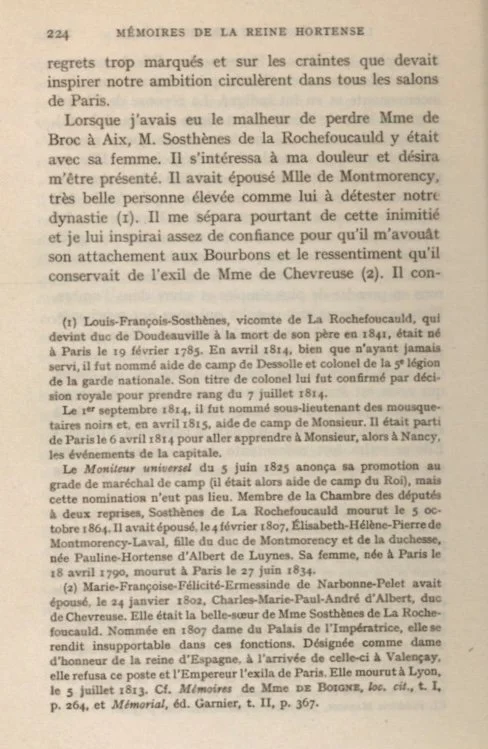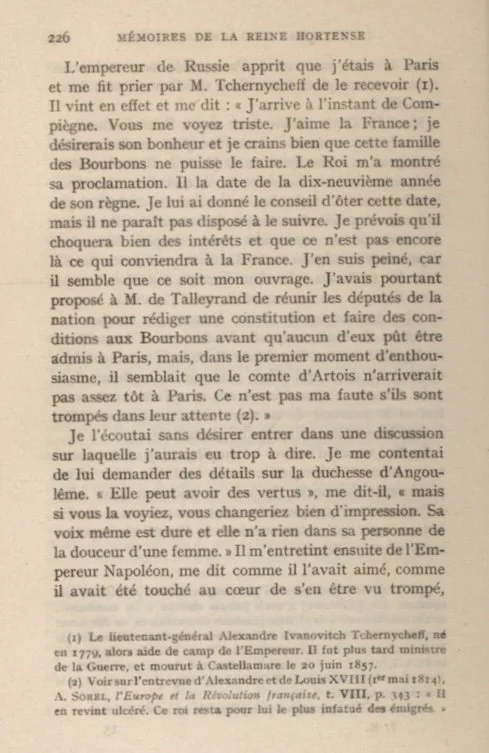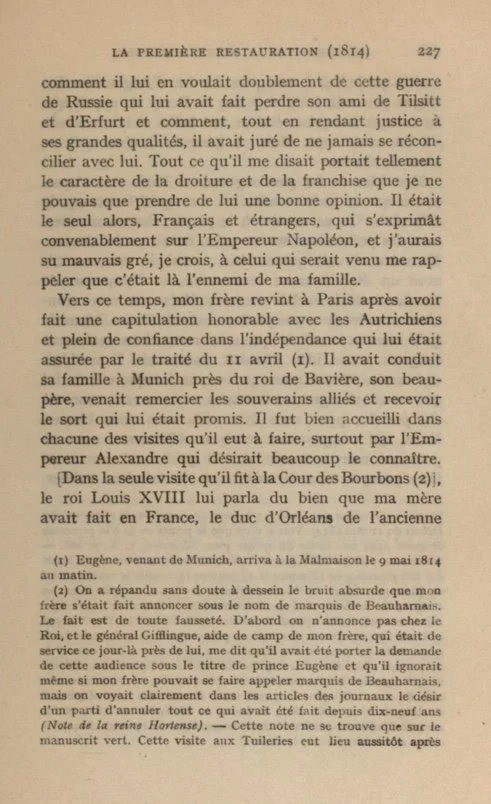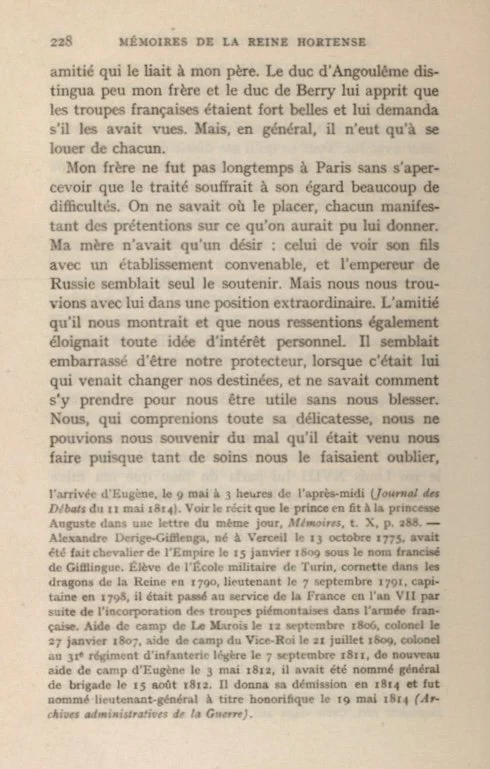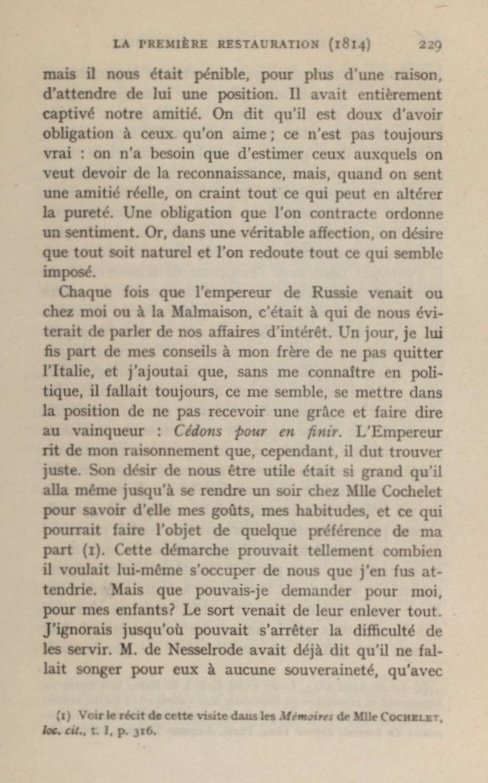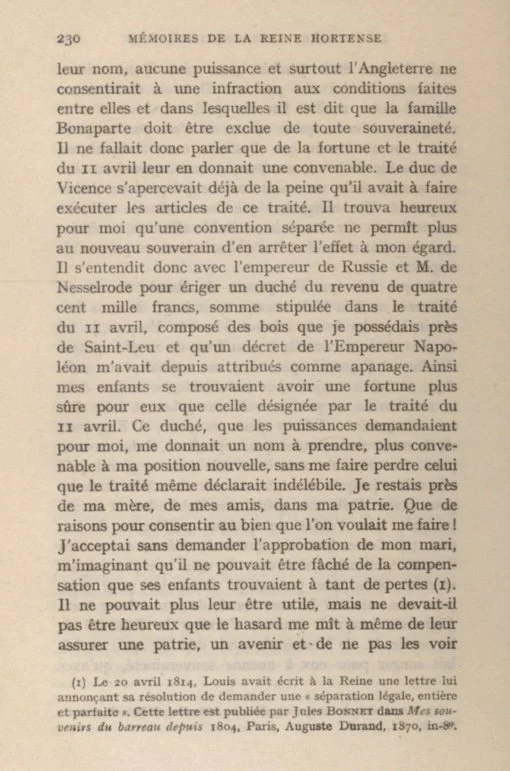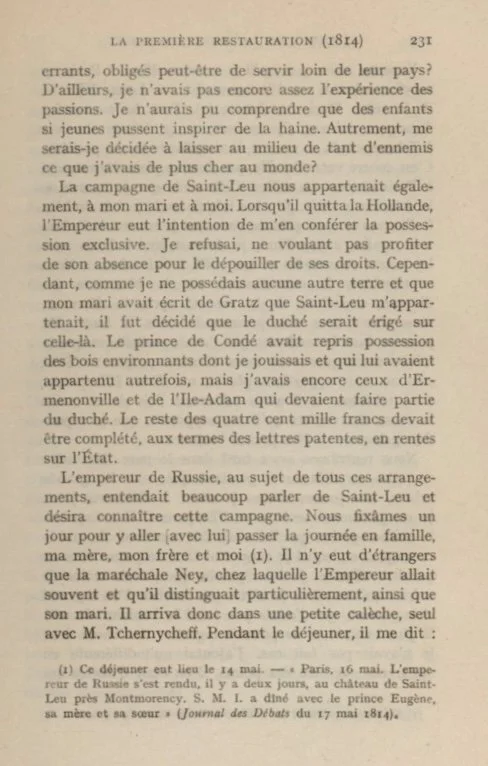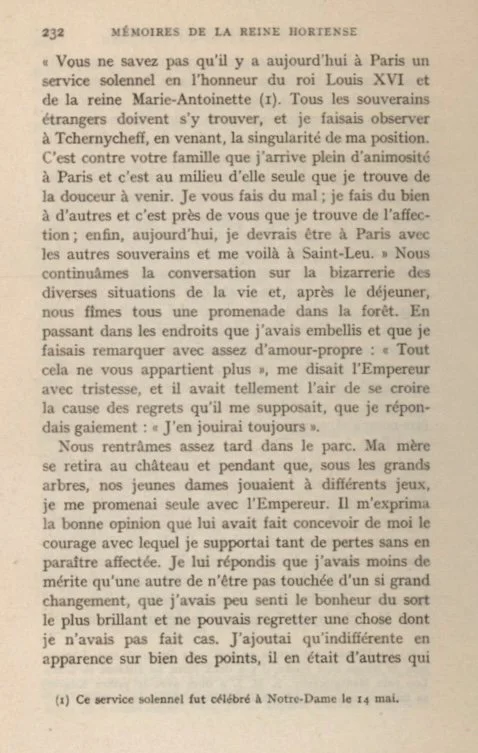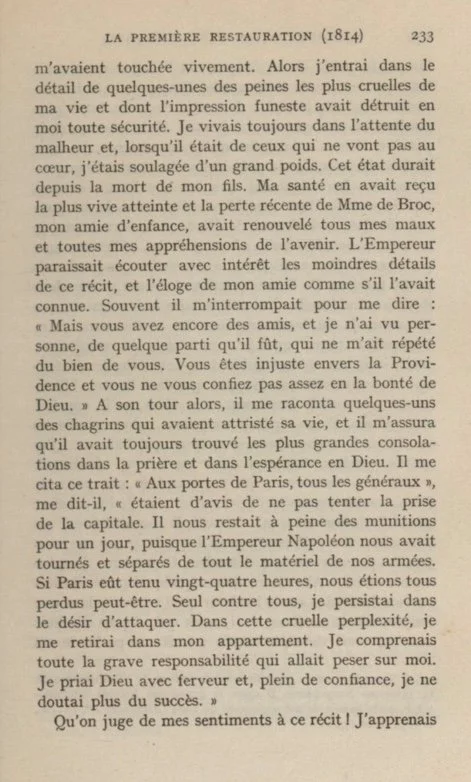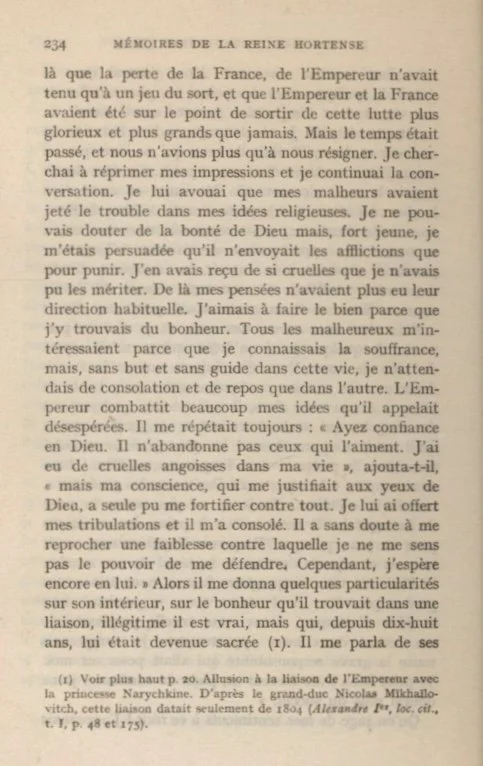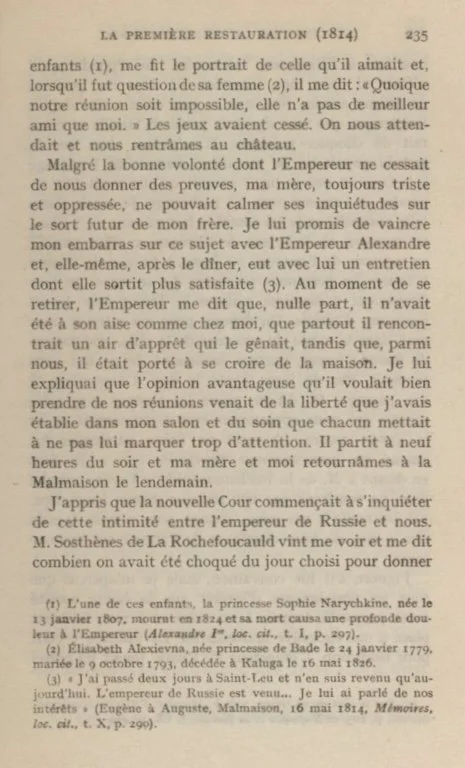Let’s have another look at Hortense’s Memoirs. If you want to read the book it is available for free at the side bar in English and French. Use the widget on the sidebar to translate the text below into pretty much any language.
Hortense’s “new best friend” Tzar Alexander appears to be her only protector while most other aristocrats appear to be openly against her. Then Tzar Alexander just so happens to anger other aristocrats further against Hortense by snubbing one of their ceremonies and making it appear that it was Hortense’s fault they were being rejected by Tzar Alexander. Was this in reality a trick to isolate Hortense from support?
Since the 2 sides had been set up as a “reality” for Hortense, obviously Hortense would become more inclined to rely on her “new best friend” who was telling her everything she would want to hear - given her well known nature.
This is a great example of how a target is swarmed with a new fake reality which is created to leave that target bereft of support and options.
In this passage, it is also described how most of this new aristocracy - willing to go along with anything for personal ambition - help co-create the illusion that Napoleon had never ruled France if that is what it takes to secure advantages from the new regime. Is this familiar?
Here you see the synthetically created illusion of 2 sides playing out to disorient Hortense. This is a hallmark strategy of that regime and the one under we we find ourselves these days.
If more people understand “the game” perhaps its characteristic illusions will stop controlling so many. May these strategies no longer work on us!
Hortense’s memoirs continues:
At the time when I had had the misfortune to lose Madame de Broc at Aix, Monsieur Sosthenes de la Rochefoucauld was there with his wife. He had sympathized with my grief and asked to be presented to me. He had married a Mademoiselle de Montmorency, who was very beautiful. Both had been brought up to hate our dynasty. He, however, did not include me in this enmity, and I won his confidence to such an extent that he admitted his attachment to the Bourbons and the resentment the exile of Madame de Chevreuse had caused him.
He continued to come and see me in Paris, but made no effort to secure any position at a court which doubtless would have been only too glad to welcome him.
Madame Du Cayla, who like myself had been brought up at Saint-Germain and who had always been very friendly with me, shared the political views of Monsieur de la Rochefoucauld. Notwithstanding what had lately taken place they both continued to come and see me and did not seek to conceal their joy at the approaching return of the Bourbons. I considered this feeling a perfectly natural one. Indeed, I myself rather sympathized with this family, whose misfortunes had made such an impression on me when Madame Campan used to tell me about them. But like the majority of the French I was not aware of how many people were included in the family.
The only one ever mentioned was the Duchesse d’Angoulême. People in Paris spoke of her as a sort of angelic creature whose return would bring peace and happiness to all. Everyone was touched by the thought of the suffering she had been through and memories of her mother [Marie Antoinette] still further increased the affection people already had for her.
The King had just arrived at Compiegne. All those who hoped to belong to the new court hastened there. I selected this moment to make a trip to Paris to attend to some business matters and allow all those who still were with me an opportunity to seek to obtain new posts for themselves elsewhere.
The Emperor of Russia learned that I was in Paris and asked Monsieur Tchernycheff to inquire if I would receive him. When he called, he said: am just back from Compiegne. What I see there discourages me. I love France. I wish her to be prosperous and I fear this Bourbon family will not know how to insure her happiness.
The King showed me his proclamation. It was dated the nineteenth year of his reign. I advised him to remove this date, but he did not seem inclined to do so. I foresee that he will alienate many of his supporters, and his is not the kind of regime France needs. I am sorry because I feel I am to blame. But I did propose to Monsieur de Talleyrand to call the deputies together to draw up a constitution and fix definite terms on which the Bourbons should be allowed to enter Paris. But in the first moments of enthusiasm it did not seem as though the Comte d'Artois could get here quickly enough to satisfy the people.
At any rate it is not my fault if they have made a mistake." I listened to him without seeking to discuss a subject regarding which I might have said too much. I merely asked him about the Duchesse d’Angoulême.
“She may have qualities," he answered, "but if you saw her you would change your opinion of her. Even her voice is harsh and she has nothing of a woman's gentleness about her."
He afterwards spoke about the Emperor Napoleon, told me how he had loved him, and how deeply he had been hurt to discover that he had formed a mistaken estimate of his character. He also said how doubly indignant he had been with the Emperor Napoleon for having provoked this war, since it estranged him from the man he had made a friend of at Tilsit and at Erfurt. Finally, he concluded that although admitting the Emperor's genius he had sworn never to accept a reconciliation with him. Everything he said was uttered in such a frank and sincere way that I could not help forming a favorable opinion of his character. Moreover, he was the only man, Frenchman or foreigner, who spoke in a proper manner about the Emperor Napoleon.
I believe I should have been indignant with anyone who might have pointed out to me that this man was an enemy of the family to which I belonged. About this time my brother came to Paris, having surrendered on honorable terms to the Austrians.
He was full of confidence in the future on account of the stipulations concerning him contained in the treaty of April 11. He had taken his family to Munich to stay with the King of Bavaria, his father-in-law. The purpose of his visit to Paris was to thank the allied sovereigns and learn exactly what his fate was to be.
He was well received everywhere, especially by the Emperor Alexander, who was anxious to make his acquaintance. The only time he called at the court of the Bourbons the King, Louis XVIII, spoke of the good my mother had done for France; the Duc d'Orleans mentioned his former friendship with my father. The Duc d’Angoulême paid little attention to my brother, and the Duc de Berry informed him that the French troops were very fine-looking and asked if he had ever seen any of them. But on the whole Eugene could not complain of the way he was received.
My brother had not been in Paris long before he became conscious that the execution of the treaty as far as he was concerned was most difficult. No one knew where he was to go; everyone held views about what ought to be given him. My mother's sole wish was that her son should receive a position worthy of him, but the only person who supported her claims was the Emperor of Russia. As regards the latter we found ourselves in a most extraordinary position. The friendship he displayed toward us and that which we felt for him precluded any idea of either of us acting from selfish motives.
Nevertheless, he seemed embarrassed to find himself acting as our protector when it was he who had brought about the entire change in our fortunes. He did not know how to make himself useful to us without risking hurting our pride. We who appreciated all his tact could not remember the harm he had done us, because of all the kindness he displayed in order to make us forget it.
Still for more than one reason it was embarrassing to be dependent on him. He had entirely won our friendship. Though it is said to be pleasant to be under obligations to those whom you care for, that is not always true. It is enough to be able to admire those to whom one owes gratitude, but in the case of true friendship one is alarmed by anything that might tarnish the purity of that emotion.
An obligation when contracted obliges one to feel grateful. Where real friendship is concerned one wishes every feeling to be wholly spontaneous and dreads any sense of obligation. Every time the Emperor of Russia came to see me at Paris or at Malmaison it was difficult to avoid bringing up the subject of our affairs. One day I told him about having advised my brother not to leave Italy. I added that although altogether unfamiliar with politics I felt one should always avoid putting oneself in a position of asking a favor, but rather make the other party say, "Let me give way in order to have it over with."
The Emperor laughed at my methods, but doubtless he found that they were fair enough. So great was his desire to make himself useful to us that he even called one evening on Mademoiselle Cochelet to find out from her details regarding my tastes and habits and what I might particularly desire. This action revealed how much he wished to look after our interests and touched me greatly. But what was there I could ask him either for myself or for my children? Fate had just deprived them of everything. I did not then know how difficult it would be to secure any recognition for them in the way of titles or rank.
Monsieur de Nesselrode had already declared it was impossible to give them sovereign powers anywhere, that in view of the name they bore none of the powers and especially not England would consent to abrogate the agreement among themselves that no members of the Bonaparte family were to be allowed to rule.
The only thing that remained to settle was the question of their income, and for that the treaty of April 11 had made ample provision.
The Duc de Vicence recognized already how difficult it would be for him to see that the articles of this treaty were properly observed. He was pleased that in my case a separate agreement prevented the new sovereign from interfering with me.
He therefore decided with the Emperor of Russia and Monsieur de Nesselrode that a duchy should be created for me out of the income of four hundred thousand francs, the sum fixed by the treaty of April 11, and coming from the forests that I owned near Saint-Leu, which a decree of the Emperor Napoleon had turned over to me several years before.
Thus, my children would have a fortune more firmly assured them than that which was mentioned in the treaty of April 11. This duchy which the Allies asked should be given me gave me a title better suited to my present rank and at the same time did not deprive me of that which the treaty itself declared was non-revocable.
I should be able to stay near my mother, near my friends, in my native land. How many reasons there were for accepting what was offered. me. I gave my consent without asking my husband's approval, believing that he would be satisfied to have his children receive such a compensation, after all they had lost.
He could do nothing for them himself. Should he not rejoice that chance had placed me in a position to assure them a home in their own country and to provide against their wandering about, obliged perhaps to make their way in life, far from the land where they were born? It was true I did not yet know how fierce political passions could be. I could never have imagined anyone could hate little children of their age.
Otherwise I should not have decided to leave in the midst of so many enemies those who were dearer to me than anything on earth. The estate of Saint-Leu belonged jointly to me and my husband.
When the latter left Holland, the Emperor had intended to make it over entirely to me. I refused, not wishing to take advantage of the King's absence to despoil him of his property. Nevertheless, as I did not own any other ground elsewhere and as my husband had written me from Gratz that Saint-Leu belonged to me, it was decided that it was there the duchy should be created.
The Prince of Conde had taken over again the possession of the forest which I owned but which formerly had belonged to him, but I still retained those of Ermenonville and of L'Ile-Adam, which were to belong to the duchy. The rest of the four hundred thousand francs was to consist, as agreed, in government securities.
While these various negotiations were going on, the Emperor of Russia naturally heard Saint-Leu frequently mentioned and wished to see what it looked like. He fixed a date on which to get up a family party to spend the day there. The party consisted of himself, my mother, my brother and me.
The only other person was Marechale Ney, whom the Emperor frequently called on and of whom, like her husband, he was very fond. The Emperor drove up in a little calash, accompanied by Monsieur Tchernycheff.
During lunch he remarked to me "Do you know that there is a solemn service being celebrated in Paris today in honor of King Louis XVI and Queen Marie Antoinette? All the foreign monarchs are supposed to attend, and as we drove out here, I pointed to Tchernycheff the curious position in which I find myself. I arrived at Paris filled with animosity against your family, and it is only in their company that I enjoy spending my time. I have inflicted injuries on you; I have benefited others; but it is only from you I secure sincere affection.
Today I should be at Paris with the other kings and here I am at Saint-Leu." We kept on chatting about the strangeness of human life and after lunch we all took a walk in the forest. We passed certain spots where I had had improvements made and which I pointed out with considerable pride. "None of this still belongs to you," remarked the Emperor sadly.
He seemed so sorry to think that it was he who was responsible for the grief I probably felt that I answered gaily, "At least I am still able to enjoy it." We remained till quite late in the park. My mother retired to the château, and while my young ladies played different games in the shadows of the tall trees, I walked about alone with the Emperor.
He informed me how high an opinion of me he had conceived on account of my courage in enduring so many losses without seeming to be afflicted by them. I replied that I deserved less credit for not having been saddened by such a great loss than another person might have, since I had never really enjoyed my brilliant state and could not regret deeply a thing about which I had never particularly cared.
I added that although I was indifferent about many things there were others which touched me deeply. Thereupon I proceeded to describe some of the saddest experiences I had gone through, the bitterness of which had destroyed my peace of mind. I was constantly expecting a new misfortune to befall me, and when it was not one which touched my heart, I felt greatly relieved. This condition had existed since the death of my son. My health had been profoundly affected and the recent loss of Madame de Broc, that friend of my childhood, had renewed all my despair and my fear of the future.
The Emperor seemed to listen most attentively to even the slightest detail of my narrative and to be as much moved by my eulogy of my friend as though he had known her. Frequently he would interrupt me with the remark: "But you still have friends. I have not met anyone anywhere who has not spoken well of you. You are unjust toward Providence and you do not trust enough in the loving-kindness of God."
He in turn related some of the sorrows that had saddened his life. He assured me he had always found prayer a great consolation, and he placed his hopes in God. He told me this incident: "When we were at the gates of Paris all the generals believed we ought not to attempt to take the city. We hardly had ammunition enough left for one day, as the Emperor Napoleon had outflanked us and cut us off from all our supplies. If Paris had resisted twenty-four hours, we might all have been lost. Alone, holding out against all the others, I persisted in favor of an attack. In this moment of cruel perplexity, I withdrew to my own apartment. I realized the heavy responsibility which rested on my shoulders. I prayed God earnestly.
“Then, full of confidence, I no longer doubted we should be successful."
Imagine what my feelings were on hearing this. I learned that the fate of France, the overthrow of the Emperor, had only been a question of luck, and that the Emperor and his country had been on the point of emerging from the struggle victorious and greater than ever. But the opportunity had passed, and we must resign ourselves. I sought to suppress my emotions and continued our conversation.
I admitted to my companion that my misfortunes had disturbed my religious beliefs. To be sure I could not doubt the goodness of God, but when still very young I had formed the idea that He only sent misfortunes to those He desired to punish. I had received such cruel blows that I could not believe I had deserved them. From then on, my ideas became unorthodox. I enjoyed doing good because it made me happy.
All people who were unfortunate aroused my sympathy because I knew what it was to suffer, but deprived of any purpose in life or any spiritual guidance I looked only to the hereafter to give me any consolation, any escape from my troubles.
The Emperor disagreed with many of my ideas, which he considered pessimistic. He repeated to me several times: "Trust in God. He does not abandon those who love Him. . .. I have had cruel experiences in my own life," he added, "but my conscience, which justified me in the sight of God, fortified me always. I brought Him my troubles and He comforted me. He could justly reproach me for a certain fault which I feel I have not the power to resist. Yet I still place my trust in Him."
The Emperor went on to give me some details about his domestic life, in the happiness he found in a love-affair, illegitimate it is true, but which in the eighteen years it had lasted he had come to consider a sacred bond. He spoke of his children, described the woman he loved, and when his wife was mentioned he said, "Although any reconciliation is impossible between us, she has no better friend than I in the world."
The games the young ladies were playing had stopped. People were waiting for us. We went back into the house. In spite of the kindness the Emperor did not cease to display towards us, my mother, who was constantly sad and depressed, could not overcome her anxiety regarding my brother's future.
I promised her that I would overcome my embarrassment and speak to the Emperor Alexander about this, but after dinner she herself had a talk with him which seemed to relieve her mind. When he was on the point of retiring for the night the Emperor assured me that nowhere had he felt as much at home as in my house.
Elsewhere, wherever he went he encountered a formal atmosphere which he found oppressive. Instead of this, when he was with us he felt as though he were at home. I explained that the flattering opinion he had formed was due to the informal atmosphere I had created in my drawing-room and the pains everyone took not to seem unduly conscious of his presence.
The original French is available below:


